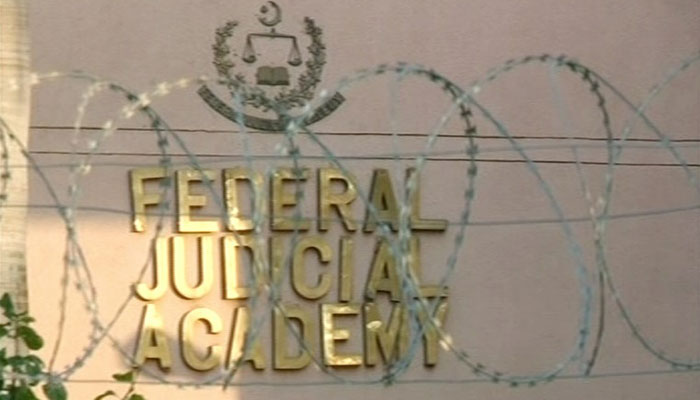Counsel for PM’s children submits objections to JIT report
July 20, 2017

ISLAMABAD: Presenting his arguments before the three-member special implementation bench of the Supreme Court on Thursday, Advocate Salman Akram Raja submitted a 17-page petition detailing objections to the Joint Investigation Team’s report into the Sharif family’s businesses.
Raja, the counsel for the prime minister’s children Maryam, Hussian and Hasan, prayed the court to dismiss the JIT report as well as the three constitutional petitions in the Panama Papers case.
Detailing the objections, the petition states that the material obtained by the JIT, whether through Mutual Legal Assistance (MLA) or through ‘unauthorised sources’, appeared to be at variance with the stance taken by the premier’s children. “This material was concealed from the respondents so as to deny them any opportunity to correct the impression formed by the JIT on the basis of such concealed material,” the petition states.
It says the JIT placed uncritical reliance on documents received through MLA requests so as to block all other avenues of investigation
The JIT also arrived at the conclusion, based solely on a letter of UAE Ministry of Justice dated June 28, 2017, that no scrap machinery had been transported from Dubai to Jeddah during the period 2001-2, the petition states.
The petition also accuses the JIT saying its ‘dominant objective’ was to somehow implicate Maryam Nawaz.
Regarding Maryam’s association with offshore companies Nielsen and Nescoll, the petition states that the relevant information could have been verified by the JIT from the directors of Minerva and JPCA Limited as well as Qatari Prince Sheikh Hamad bin Jassim and Waqar Ahmad [Hasan’s London-based business manager]. “This information would have conclusively demolished the allegation that Maryam was or is the beneficial owner of shares of Nielsen and Nescoll.”
The petition also delves into the Calibri controversy, saying the font was available for use in 2004 and thus the JIT’s allegations regarding it are baseless.
It states that “The malice against Respondent No.6 (Mrs. Maryam Safdar) that runs throughout the JIT report is also brought out by the allegation of forgery levelled against her with respect to the Trust Deed dated 2 and 4 February, 2006 between Respondent No.6 and Respondent No.7. Respondent No.7 takes full responsibility for the drafting of the said Trust Deed and for its presentation before this Honourable Court through CMA No. 7661/2016. It is denied that the Trust Deed dated 2 and 4 February, 2006 was drafted and executed at a later date. The allegation made in the JIT report on the basis of the availability of the Calibri font through the Microsoft Office Software in the year 2007 is unwarranted and misplaced. In fact, the Calibri font was available for download and used as far back as in the year 2004.”
Moreover, the petition claims that the reliance by the JIT on the letter of the UAE Ministry of Justice dated 28 June, 2017 in order to ‘conclusively’ determine that the share sale agreement of April 14, 1980 never took place is entirely unwarranted. “The statement in the aforesaid letter of the UAE ministry that the agreement was not available in the Dubai court system is clearly erroneous.” The petitioner states that a ‘duly’ notarised and certified copy of the agreement was obtained by Hussain from the official repository and had he [Hussain] been confronted with the ministry’s letter the matter could have been taken up by with the relevant authorities in Dubai and the error would have been clarified.
“It is clear that the JIT was not interested in exploring the relevant facts from all available avenues,” it stated.
With regards to the premier’s cousin Tariq Shafi, it has been stated in the petition that the JIT report ‘unduly exaggerates the so-called deviation’ in stance between the two affidavits of Shafi dated November 12, 2016 and January 20, 2017 as well as his statement before the JIT.
“The JIT report has described this narration of facts as “perplexing” but has not been able to posit any definitive reason for rejecting the aforesaid narration of facts.”
The report of the JIT suffers from patent confusion and duality as regards the treatment of the share sale agreement of 14 April, 1980
Regarding the Qatari prince, the petition states that the failure of the JIT to examine Sheikh Hammad has left a ‘gaping’ hole in the JIT report. The petition refers to page 90 of the report’s volume one where the JIT reportedly acknowledges the importance of the statement/evidence that the Qatari prince might have been able to provide.
The petition claims that the JIT report failed to discover anything untoward about Hill Metal Establishment.
Referring to the ‘gifts’ sent by Hussain to his father, the petition states that ‘Hussain has made available funds by way of gifts to his father and sister (Maryam) out of a sense of commitment, love and affection so as to enable the two to play their roles in the betterment and progress of their motherland’.
“There is no question of any wrong doing with respect to the business of Respondent No.7 [Hussain] in the Kingdom of Saudi Arabia,” it is stated in the petition.
The petition has claimed that Hasan’s business activity in the United Kingdom has been carried out in an extensively regulated environment. The petition further explains the receipt of $4.21 million by Hasan from Flagship Investments from 2001 to 2004. It says the funds came through lawful channels and were made available to Hasan’s business entities by a London law firm.
“All business activity of Respondent No.8 [Hasan] in the United Kingdom has since been conducted on the basis of loans obtained from various banks and financial Institutions as well as duly recorded and declared transfer of funds from his brother, Respondent No.7 [Hussain].”












